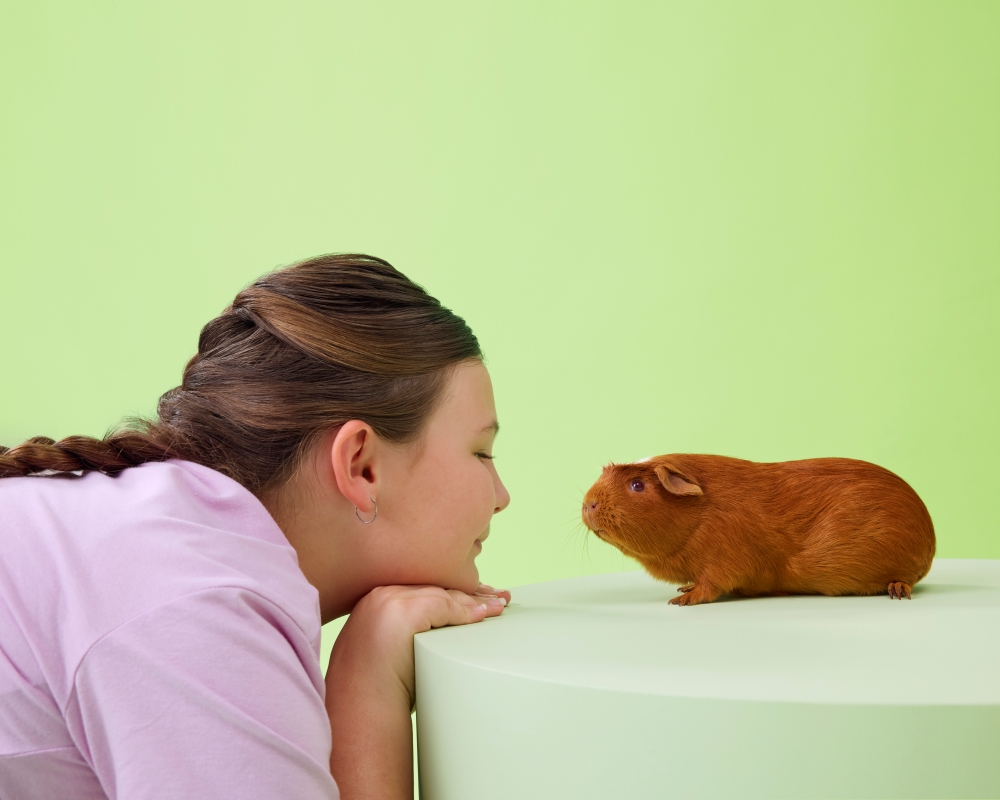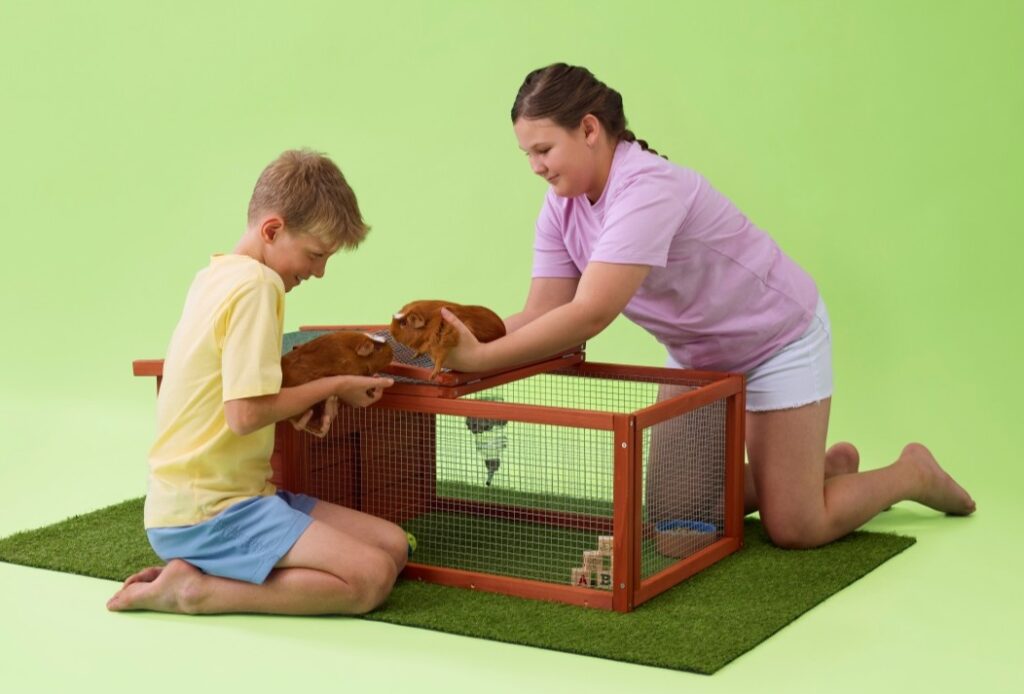Guinea pigs are intelligent, charismatic, chatty and adorable little friends to introduce into your family. Learn everything you need about these cute little mammals in this comprehensive guide to taking care of guinea pigs.
Guinea pigs require a safe home, complete and balanced diet and plenty of love and attention. Be prepared to share lots of love and affection with your adorable new friends.
Table of contents:
- Hutch requirements for guinea pigs
- Feeding guinea pigs
- Guinea pig-proofing your home
- Grooming guinea pigs
- Health care for guinea pigs
- Guinea pig essentials checklist
- Guinea pig FAQs

Preparing your guinea pigs’ home
What size hutch do guinea pigs need?
The more guinea pigs you have, the bigger the hutch you’ll need. The absolute minimum floor space required for one female is 1200cm2 with a wall. A floor space of three to four times this is recommended if breeding guinea pigs.
Ask your local Petbarn team members for advice on the perfect enclosure.
Where should you place a guinea pig hutch?
Place the enclosure out of reach of other animals and out of any areas exposed to draughts and direct sunlight.
Provide adequate heat protection as guinea pigs are susceptible to heat stress. Avoid exposing guinea pigs to temperatures above 25°C for long periods of time and take steps to keep them cool in summer. These pets will thrive in temperatures ranging from 18–25°C.
What do you put on the bottom of a guinea pig hutch?
Line the hutch with newspaper covered with soft bedding like straw, wood shavings, or recycled paper.
What items do you need to put in a guinea pig hutch?
Hang a drink bottle on the outside of the enclosure with the spout pointing inside. A heavy food bowl is necessary, as is a hidey hut and toys.
What’s the best way for guinea pigs to drink water?
A guinea pig needs about 100ml of water per day, and it’s important to change their water daily. We suggest using a hanging water dispenser, as water bowls can be messy and are often tipped over. It’s best to refresh your guinea pig’s water every morning, but keep an eye on their water during hot days.
How often should you clean a guinea pig cage?
Spot clean your guinea pigs’ cage daily and do a thorough clean every two to three days. Replace the bedding, wipe down the cage with hot water and wash the elements, such as toys and drink bottles, with a guinea pig-safe disinfectant.
You’ll need a substitute home for your guinea pigs while you clean – a travel cage is perfect.
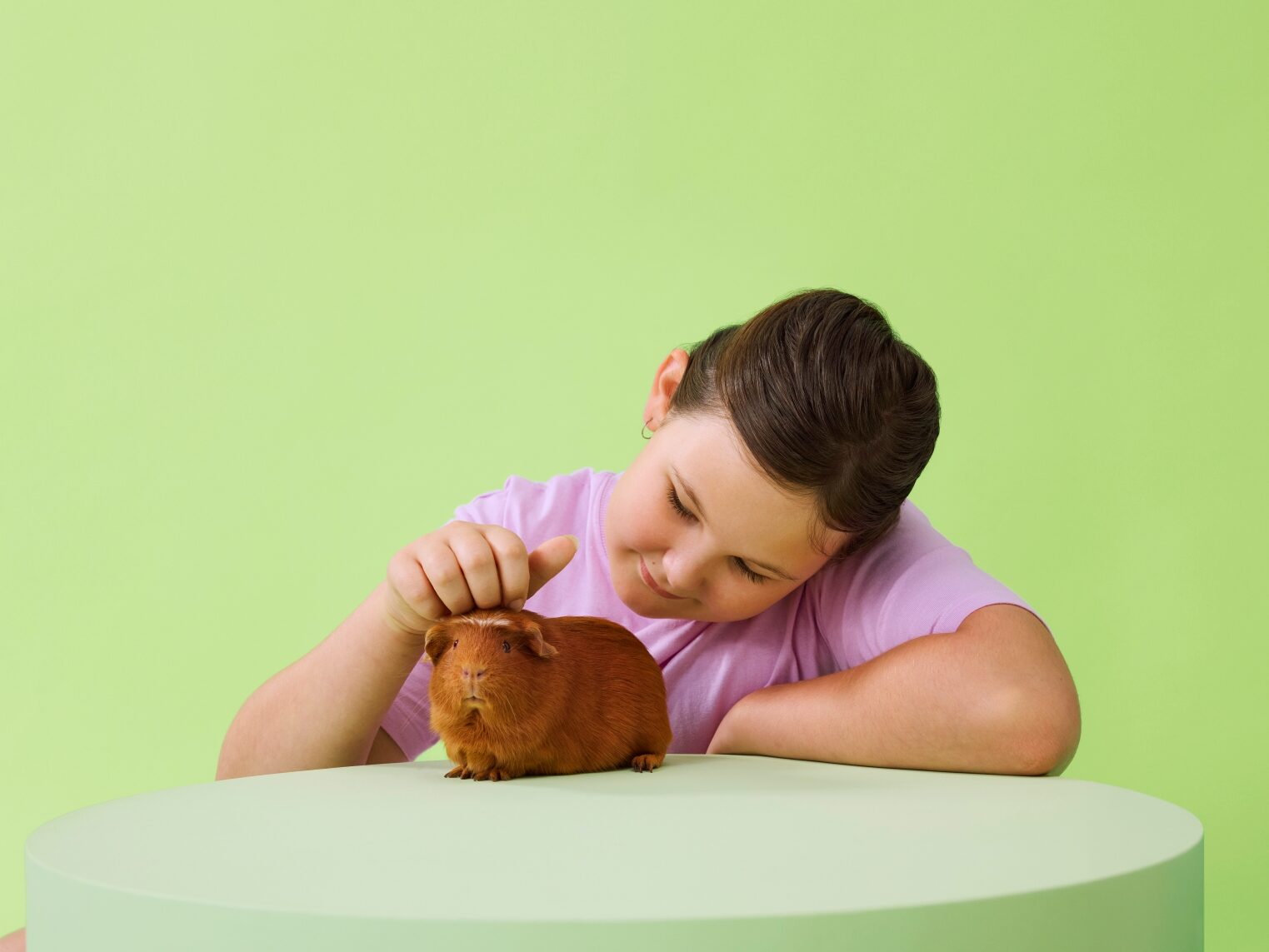
Feeding your guinea pigs
What do guinea pigs eat?
Guinea pig nutrition is a bit different to other pets like dogs and cats. The main part of your guinea pigs diet should be hay. For these herbivores, chewing hay is important to stop their teeth from growing too long in addition to nutrition.
Guinea pigs also love to munch on veggies like broccoli, cabbage and celery, as well as herbs like mint, parsley, and coriander. Keep in mind that you should throw out any fruit and vegetables that have been in their hutch for more than 24 hours.
You can also give guinea pig pellets, which you can find at your local Petbarn. These should only supplement other items on the menu, and not be the main basis of their diet.
Guinea pigs are unable to make their own vitamin C. While some vegetables contain vitamin C, you will need to provide your pets with a suitable supplement to keep them healthy.
If harvesting plants from your backyard to feed to your guinea pigs, ensure they are free of pesticides, as these chemicals can be harmful to your pet.
What foods are bad for guinea pigs?
Do NOT feed your guinea pig:
- Grains
- Cereals
- Nuts
- Lawn clippings
- Rhubarb leaves
- Pink clover
- Hemlock
- Chocolate
- Caffeine
- Alcohol
Avoid feeding your guinea pig grains, cereals or nuts as this may cause digestive problems.
Guinea pig-proofing your home and backyard
Let your pet guinea pig run inside or outside every so often. Get a playpen for outdoor runs.
For indoor adventures, block any small holes and ensure no other animals have access to the room. Remove electrical wires, ingestible items and toxic plants and maintain supervision at all times.
Grooming your guinea pigs
An essential part of parenting a guinea pig is grooming. Just like you, your guinea pig will need some hair maintenance every once in a while. Handling and grooming your guinea pig once a day will give you plenty of bonding time and will improve their confidence and comfort when being handled.
How to groom a guinea pig
Using a firm, soft brush – you can find suitable guinea pig grooming options at your local Petbarn – remove any excess hair, tangles, or anything else that may have been caught up in there, like twigs and leaves.
During your regular grooming routine, make sure to check your guinea pig’s skin and nails. You will need to take your guinea pig to your local Greencross Vets for a little manicure when their claws get too long.
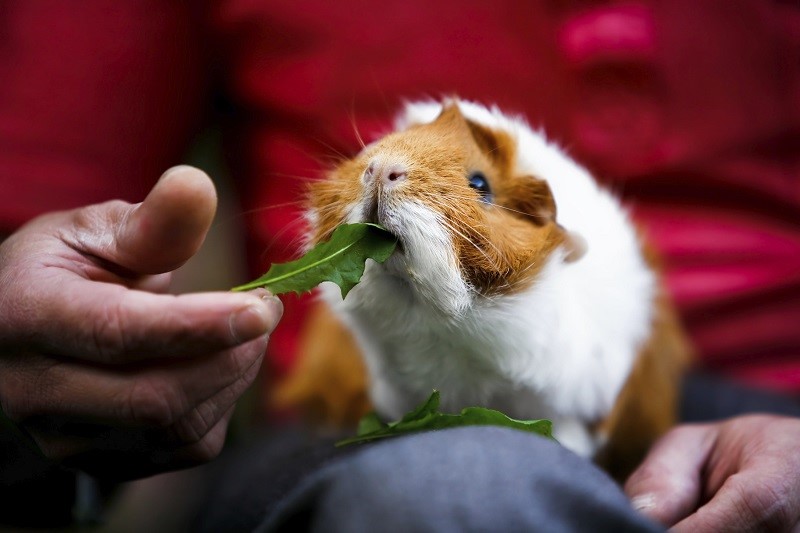
Caring for your guinea pigs’ health
Guinea pigs are susceptible to contracting various ailments. Keep your guinea pig in good health by being proactive with preventative health. If cared for properly and taken for biannual check-ups at your local Greencross Vets, your guinea pig will be less likely to fall ill.
A few of the many guinea pig veterinary needs offered for you and your pet are: desexing for both male and female guinea pigs, parasite control, dental care, preventative medicine, nutritional and husbandry advice and supplies, and nail trimming.
What health issues are guinea pigs prone to?
Your guinea pig is vulnerable to skin ailments, fleas, vitamin C deficiency and dental problems.
How to care for your guinea pigs’ teeth
One of the key things to remember with your guinea pig is that their teeth grow constantly. If their teeth become overgrown, it can lead to serious health problems and will need to be looked at by your vet.
To help look after your guinea pigs’ teeth, feed them plenty of chew sticks and abrasive foods such as celery, broccoli, corn and husks to gnaw on and keep their teeth trim and in check.
Should you desex guinea pigs?
Desexing your guinea pig may their risk of disease, increase their lifespan, make them calmer and stop them reproducing. Your local Greencross Vets will be able to do this for your new pet.
Signs of illness in guinea pigs
A healthy guinea pig will be alert, active and have a shiny coat.
Signs your guinea pig may be sick include:
- Lethargy
- Irregular bowel movements
- A dull coat
- Itchiness
- No interest in food
If you notice your pet is showing any of these signs, don’t hesitate to visit your local Greencross Vets who can recommend the right health products or treatments your guinea pig may need.
Guinea pig essentials checklist
Find everything you need for your guinea pig in the small animal supplies section of Petbarn online and in-store.
Housing
Food
- Veggies
- Vitamin C supplement
- Hay
- Pellets
- Fruits (as treats only)
- Treats
Miscellaneous
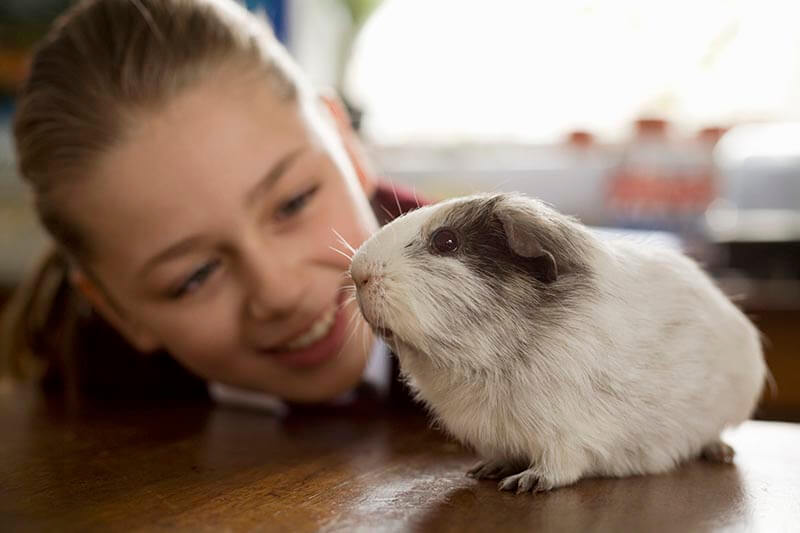
Frequently asked questions about guinea pigs
How long do guinea pigs live?
Most guinea pigs will live from five to nine years but, if kept in optimum conditions and in good health, some are known to live up to 10 years.
How big do guinea pigs get?
Guinea pigs may grow up to 25cm long.
Should guinea pigs live alone or in groups?
Guinea pigs are very sociable and group-oriented pets. If you’re bringing more than one guinea pig into your home, avoid choosing different sexes. Non-familiar males will generally fight, though males brought up together may not. If you’re keeping guinea pigs in groups, ensure they are single-sex or desexed individuals as this may help to eliminate aggression.
How many breeds of guinea pigs are there?
Guinea pigs are also known as cavies, which is derived from the scientific name Cavia porcellus. According to the American Cavy Breeders Association, there are thirteen breeds of guinea pig.
What’s the best way to pick up a guinea pig?
Guinea pigs are best picked up when they’re in the crouch position. Placing your hand over their shoulders will encourage them to get into this position so you are then able to scoop them up from underneath with your other hand.
Be sure to use both hands to hold them, as they startle easily and may scamper off. Hold them close to you and support them from underneath.
Consistent daily interaction is the key to winning over your guinea pig. Use a gentle voice and steady movements to settle your pet and help them develop trust.
Why is my guinea pig bouncing?
When they’re feeling energetic, a guinea pig is likely to start ‘popcorning’, where they jump around in excitement. This is a happy sing from your pet, though they may grow out of it when they get a little older.
Can guinea pigs live with rabbits or other small mammals?
Don’t house guinea pigs with other small animals such as rabbits. Mixing guinea pigs with rabbits is not recommended as it can spread disease. You want to create a stress-free environment for your new pets and housing them with animals double their size will have the opposite effect.

